- The new world of work has positioned HR at the epicenter of every organizational initiative
- Today’s HR leaders need to provide talent management smarter, faster, and do it at scale — all while providing a personalized and positive employee experience
- HR organizations can do this by using AI to drive productivity and efficiency, increase the speed of service delivery, and augment talent professionals’ work with on-demand insights for more informed decision-making
In the world of work, change is happening faster than ever. It’s anticipated that 44% of workers’ core skills are expected to change and 23% of jobs will change within the next five years, according to the World Economic Forum’s latest Future of Jobs Report.
While it will be challenging to navigate these shifts, there is an unprecedented opportunity to position HR at the epicenter of every organization. As a talent professional, you have to work smarter, faster, and do it at scale, all while providing a highly personalized and productive employee experience.
The only way to do all this — and do it well — is with the help of AI. And while many organizations have undergone a digital transformation, truly putting AI to work still requires a talent transformation to develop the necessary skills.
AI can drive productivity and efficiency by automating activities and increasing service delivery speed. It can augment your work with on-demand insights and support, and extend the capabilities of any HR team by performing tasks not easily done by people, like analyzing large, unstructured data sets to enable decision-making.
I recently discussed this topic with Deloitte’s Sona Manzo, Managing Director in Workforce Transformation, and Greg Vert, Digital and HR Transformation Leader. We talked about how HR leaders can strategically position themselves and their organizations for success with more advanced technologies powered by AI.
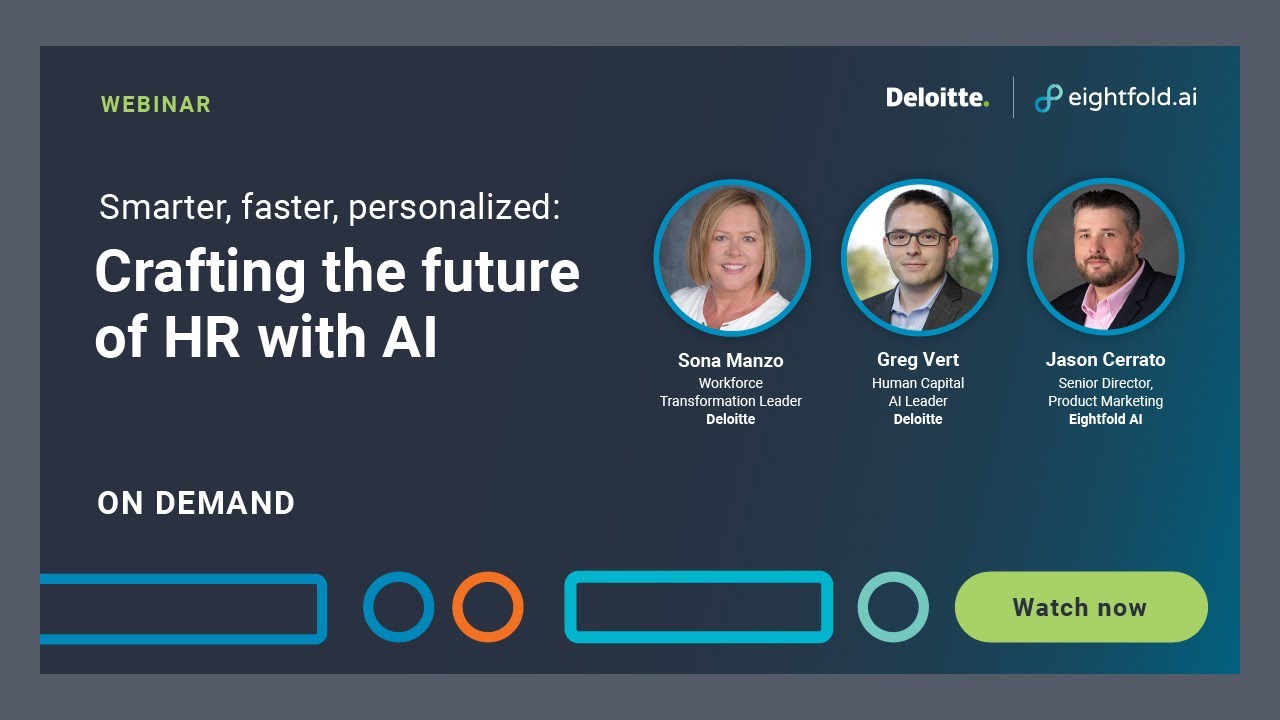
Related content: Watch our entire conversation with Deloitte on crafting the future of HR with AI.
How HR can use AI to create value
Even if you are just beginning to explore the opportunities with AI in your organization, it’s easy to be overwhelmed.
“Artificial intelligence is kind of an umbrella term, and underneath that there’s a lot of different capabilities, a lot of different technologies that really make up what we refer to as AI,” Vert said. “Instead of getting lost in all that, we usually start by asking what the technology can do for the organization.”
From this simple question, there are typically four categories of how AI can be implemented within an HR organization: Automation of operational tasks and processes; support for HR users; insight for more informed decision-making; and generative deep-learning models.
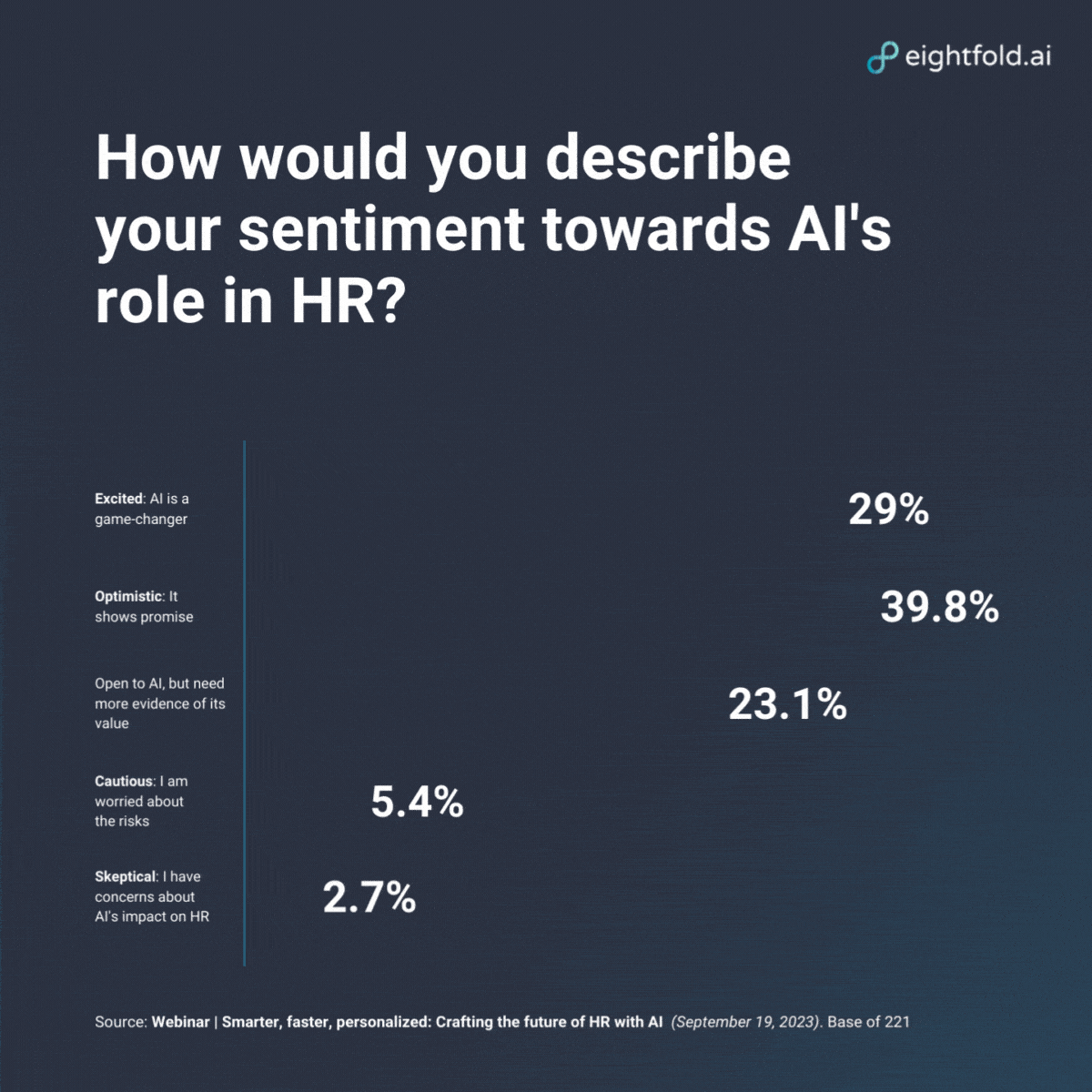
Nearly 70% of our survey respondents said they were excited or optimistic about AI in HR.
AI can also be effective in augmenting the entire talent life cycle. An example would be helping draft a job description by using a combination of internal and external data to create it. Other use cases include using AI to generate pre-screening questions tailored to a role or project; creating candidate summaries for hiring managers; synthesizing interview notes; and helping address new hire questions with chatbots or digital assistants.
Another exciting application of AI in HR is talent rediscovery. For example, with our Talent Intelligence Platform, AI can surface previously hard-to-find talent insights and enrich employee profiles with their evolving skills and capabilities. This transforms the way HR can tap into talent communities by keeping everyone in the talent pool within reach based on their current skills and interests and encourage re-engagement with the organization.
AI also enables HR and other leaders to provide more positive employee experiences. You can use insights into employee skills and career paths through AI-driven learning experiences, gig marketplaces, projects, and mentorship. This unlocks new opportunities, enhancing the overall employee experience and promoting retention and career growth, ultimately putting skills at the center.
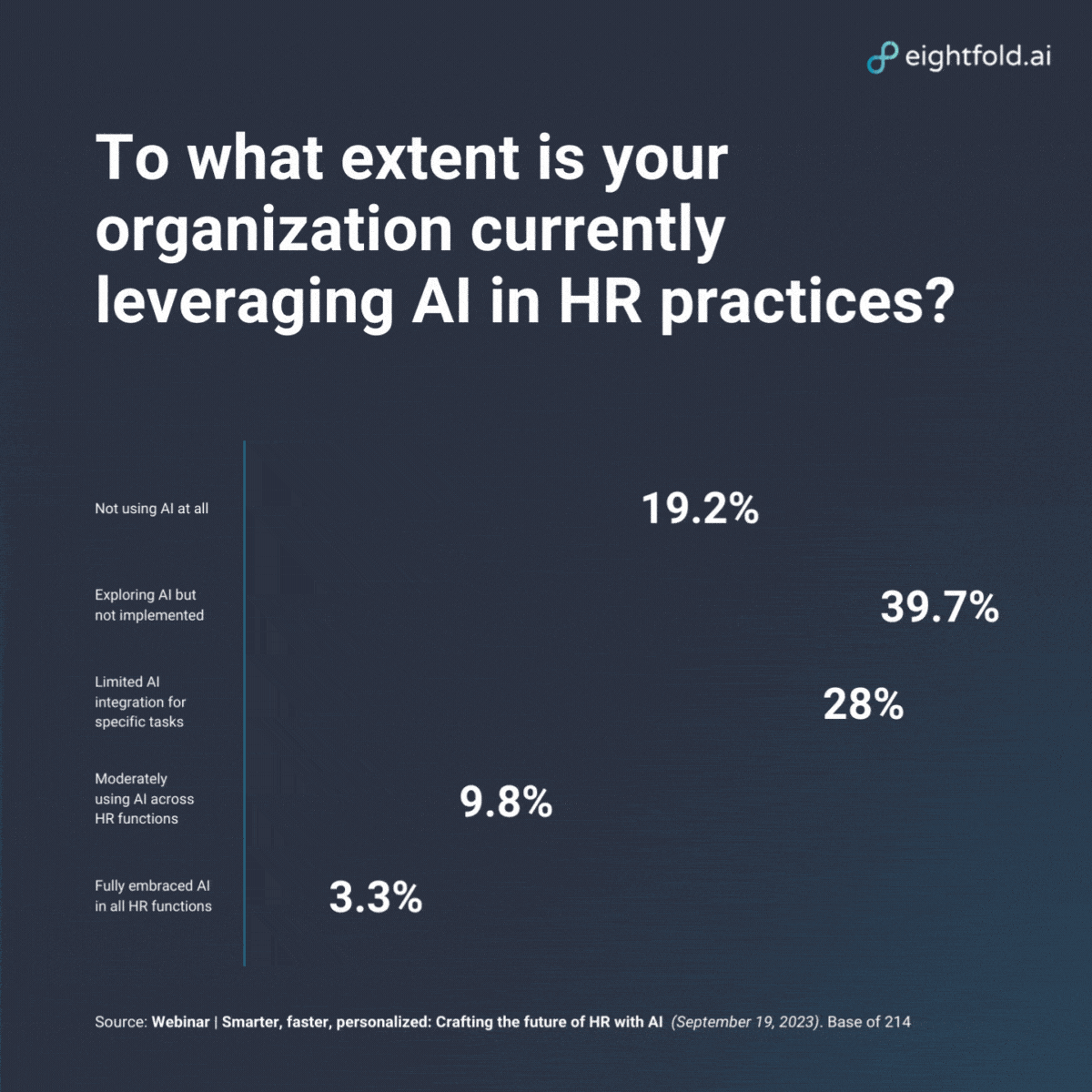
Almost 40% of our survey respondents said their HR organization is currently using AI.
How AI is shaping the future of HR
As AI is integrated into more HR functions, the future of talent is poised for substantial changes. AI will continue to automate manual tasks, streamline repetitive work, and reduce workloads within HR, but it also has the potential to do so much more, especially at scale. This opens new avenues for value creation by tackling more complex data-driven business problems.
“When we get down to the creation of new roles or job responsibilities, AI really elevates the work of humans as strategists and advisers,” Manzo said.
AI can help analyze data for insights about your workforce, and then use those insights to help create more personalized onboarding programs, something that would be impractical to do manually. It will also create new HR roles related to AI management, including those in monitoring, design, testing, and deployment, allowing you to take a more strategic role in shaping your HR landscape and supporting your organization’s goals.
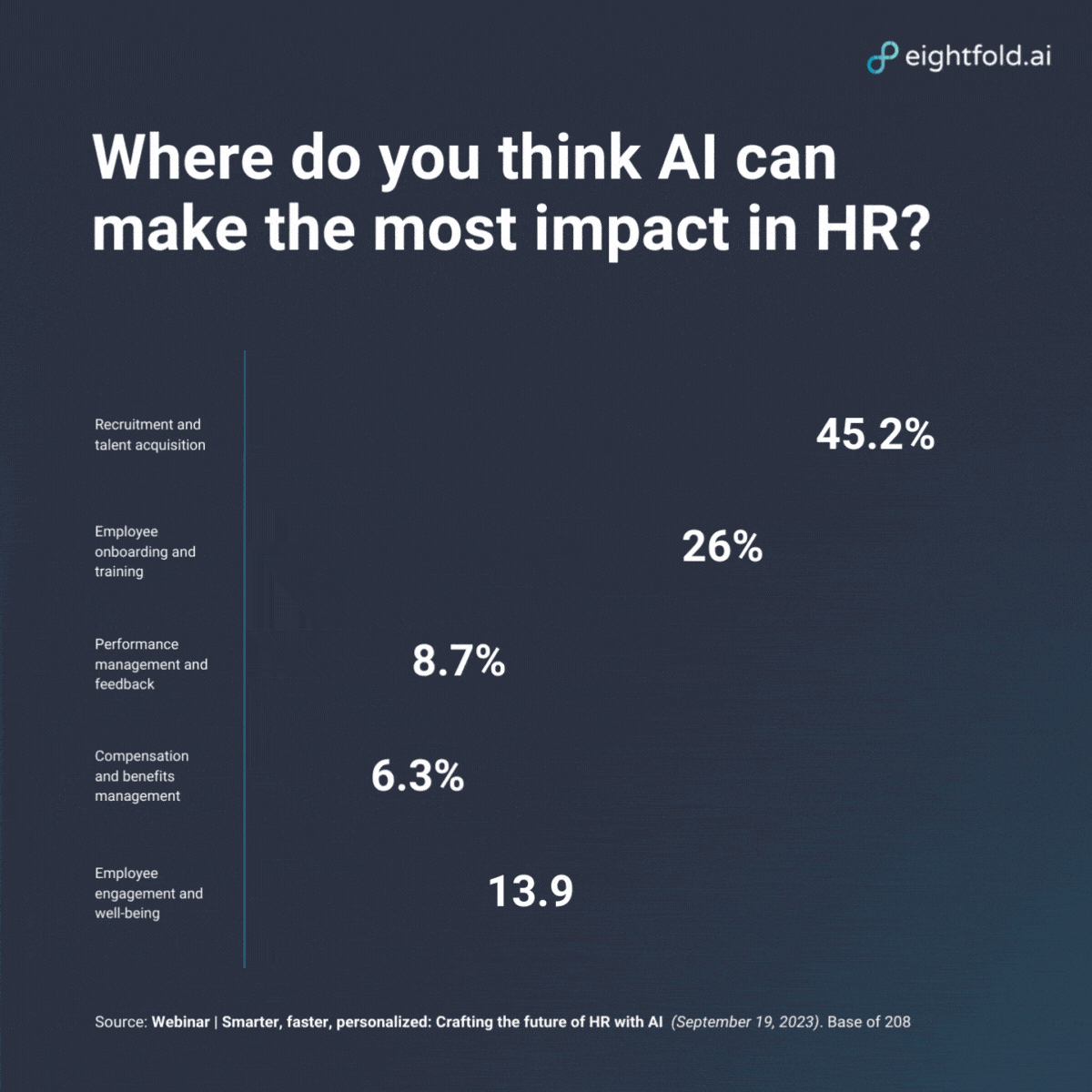
Our survey respondents said AI can make the most impact in recruitment and talent acquisition (45%), employee onboarding and training (26%), and employee engagement (almost 14%).
Vert shared early thinking by Deloitte about this new model that puts AI at the center of the HR organization. With an AI-first mind-set, you can evolve from more traditional practices to become workforce-solution architects. With the help of AI, you can use data and insights to swiftly address complex talent challenges and better support business leaders.
This massive shift requires governance, strategy, and management for successful implementation. The transformation extends beyond traditional HR roles, and emphasizes the critical importance of an agile methodology and AI proficiency — acquiring the knowledge and skills that we need, either as AI consumers or producers, to use the technology ethically and responsibly, while we transform the way we work.
HR can also adopt agile concepts like pulse check-ins instead of annual performance reviews, spot bonuses instead of annual merit cycles, and internal talent marketplaces for talent management. To respond to the faster pace of work, HR providing support for hybrid or project-based job roles for shorter cycle work can make the move toward a more agile organization.
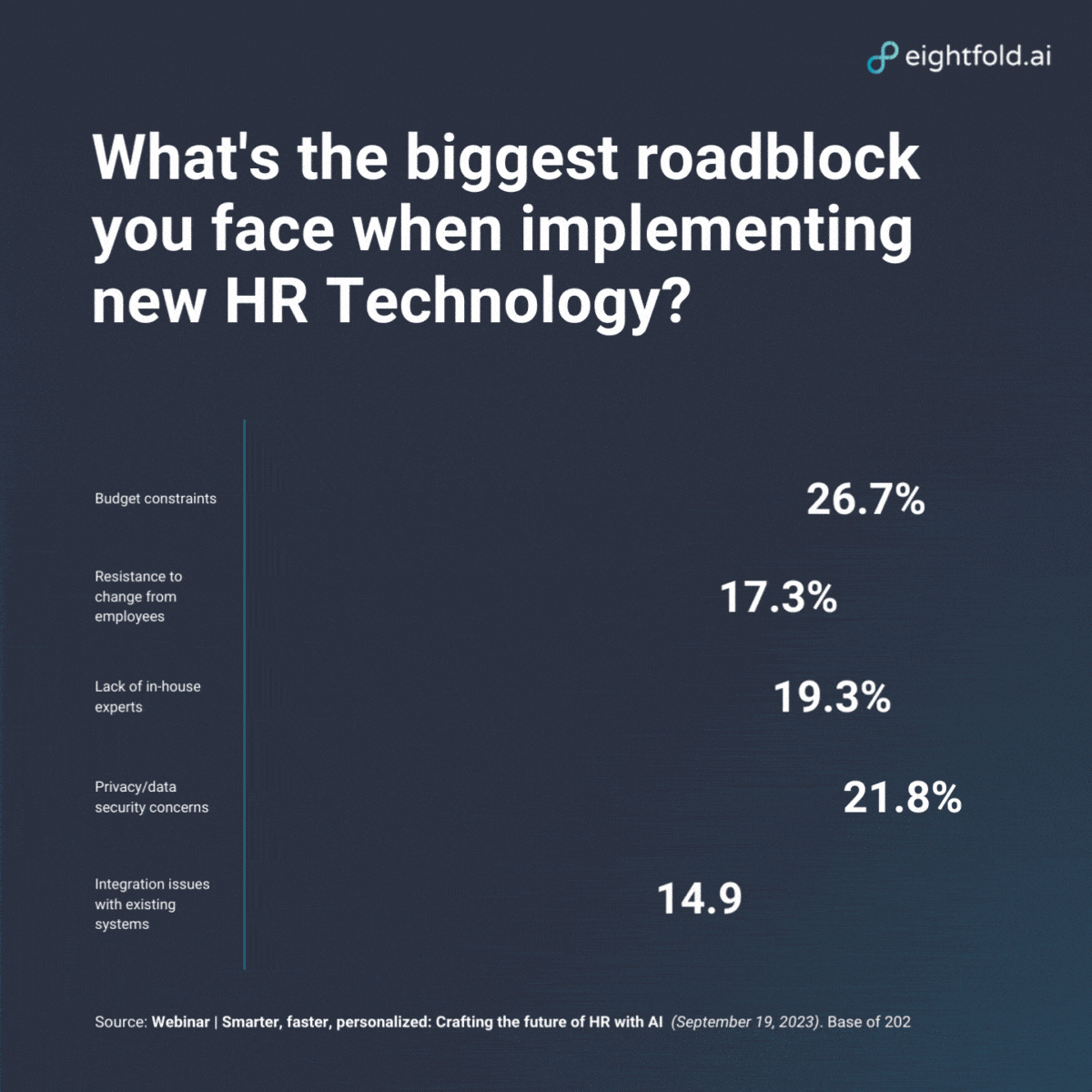
Nearly 30% of our survey respondents said budget constraints are the biggest roadblock for implementing AI in their HR organization.
How HR can lead the enterprise with an AI-enabled transformation
With the benefits of AI in HR clear, you are strategically positioned to help guide your enterprise through this critical transformation.
Approximately 300 million jobs may be affected by AI in the near future — and a people-centered approach can enhance the success of AI initiatives. Currently, AI investments have about a 50% success rate, but taking a people-first design can boost this outcome, according to Deloitte’s 2022 State of AI in the Enterprise 5th Edition Report.
Of course, trust is essential for any successful AI adoption, both in the technology and leadership’s commitment to improving the enterprise and employees’ lives. Recent Deloitte research has found that employee trust in their employers decreases by 139% when organizations offer “AI tools” to workforces.
Any AI initiative must include driving AI fluency and adoption, fostering an AI-first mind-set, prioritizing use cases for value creation, and building a culture of engagement and trust. These are all opportunities for you to play a major role. Set yourself up for success by thinking big, starting small, and scaling quickly.
Jason Cerrato is VP, Market Strategy, at Eightfold AI. Before joining Eightfold, he was an HCM industry analyst with Gartner and held talent leadership positions at United Technologies for over a decade. Cerrato is the co-host of The New Talent Code, a podcast by Eightfold AI.
Watch our webinar with Deloitte “Smarter, faster, personalized: Crafting the future of HR with AI,” on demand now.










